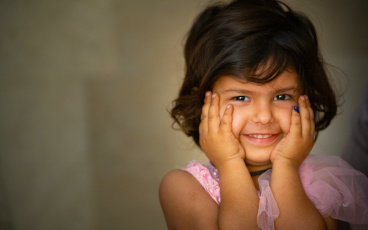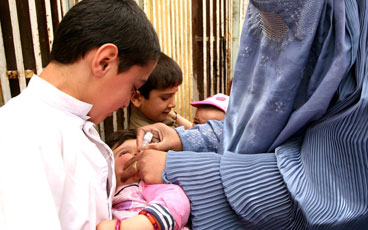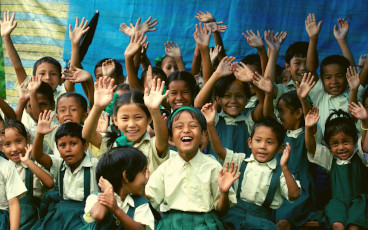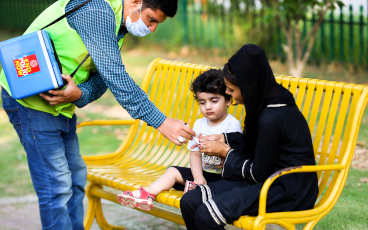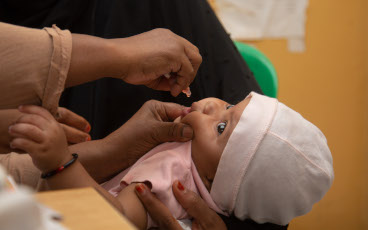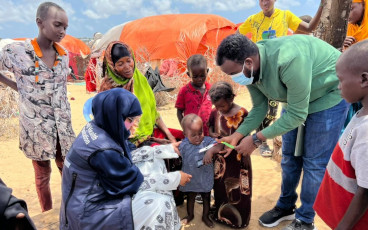Papua New Guinea Introduces the Inactivated Polio Vaccine
Part of largest globally-coordinated vaccine introduction project in history, the introduction of the inactivated polio vaccine will help to keep Papua New Guinea polio-free.
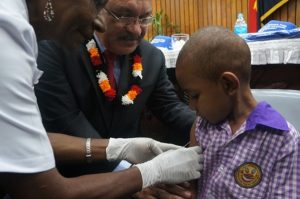
In a landmark step to accelerate the global eradication of polio and help prevent the return of the virus, Papua New Guinea has introduced the injectable Inactivated Polio Vaccine (IPV) into its routine immunization programme on 12 August. This is part of the biggest globally synchronized vaccine introduction in history, and an important step towards a polio-free world.
Prime Minister Peter Charles Paire O’Neill attended an official launch ceremony in Port Moresby on 12 August to underline the Government’s commitment to immunisation. The introduction of IPV coincided with the launch of a nationwide measles-rubella vaccine (MR) campaign. Papua New Guinea experienced a nationwide outbreak of measles at the end of 2013 with more than 2,600 confirmed cases. These two vaccine launches provide a clear reminder of the essential role of vaccines as one of the most cost-effective and impactful public health interventions available.
Today’s introduction of IPV as part of the routine immunization schedule in Papua New Guinea is part of the largest and fastest globally-coordinated vaccine introduction project in history. It is funded as part of the budget of the Global Polio Eradication Initiative (GPEI), and support is channelled through Gavi, WHO and UNICEF.
Until now, the oral polio vaccine (OPV) has been the primary tool in the global polio eradication effort, as it is the only vaccine that can stop polio because of its ability to stop transmission between people. Thanks to the global impact of OPV in reducing polio by 99% since 1988, poliovirus is now only endemic in three countries worldwide: Afghanistan, Nigeria and Pakistan.
“Despite this progress, experts caution that polio-free countries still remain at risk of re-infection until the disease has been eradicated everywhere. Adding IPV to OPV in routine immunisation schedules globally will usefully complement existing strategies to end polio,” emphasised Rotary’s International PolioPlus Chair Michael McGovern.
Adding one dose of IPV to multiple doses of OPV has been shown to boost immunity more rapidly, providing the most effective method available to stop the virus and protect children. The introduction of IPV globally is also paving the way for the eventual withdrawal of all OPV vaccines once poliovirus transmission is stopped in the few remaining polio-affected countries.
UNICEF Representative to Papua New Guinea, Mr. Baba Danbappa said: “Immunisation is one of the cheapest and most effective public health interventions for any country. The introduction of IPV and MR is an opportunity for the Government to invest more in immunisation for the future of Papua New Guinea.”
The Bill & Melinda Gates Foundation, Norway, and the United Kingdom are generously supporting the introduction of IPV in routine immunisation schedules in 72 Gavi-supported countries, while Canada is supporting its introduction in other lower-middle income countries. The top ten government donors to GPEI include the USA, the UK, Japan, Germany, Canada, the Netherlands, Norway and Australia.
The Global Polio Eradication Initiative (GPEI) is led by national governments and spearheaded by the World Health Organization (WHO), Rotary International, the US Centers for Disease Control and Prevention (CDC), and the United Nations Children’s Fund (UNICEF), with the support of the Bill & Melinda Gates Foundation.Since its launch at the World Health Assembly in 1988, the GPEI has reduced the global incidence of polio by more than 99%.
The GPEI receives financial support from governments of countries affected by polio; private sector foundations, donor governments, multilateral organizations, private individuals, humanitarian and nongovernmental organizations and corporate partners.
A full list of all contributors [pdf]


